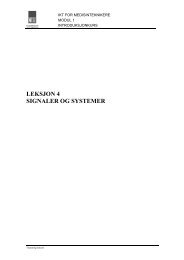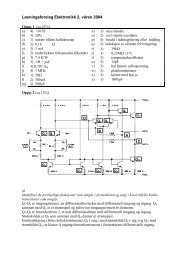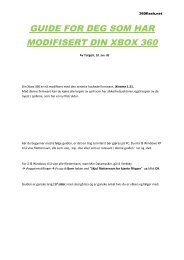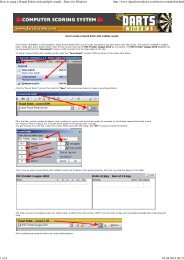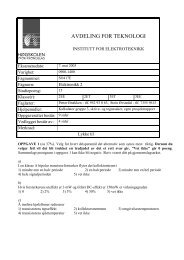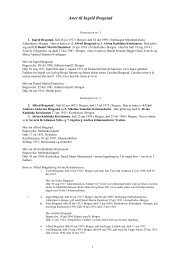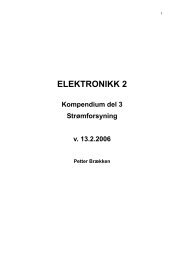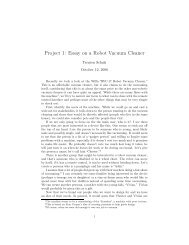The Online World resources handbook
The Online World resources handbook
The Online World resources handbook
You also want an ePaper? Increase the reach of your titles
YUMPU automatically turns print PDFs into web optimized ePapers that Google loves.
<strong>The</strong> <strong>Online</strong> <strong>World</strong>: What is it? http://home.eunet.no/~presno/bok/2.html<br />
If you are a novice, this may seem complex but none of these levels are difficult. It often<br />
helps to visualize what level you are dealing with at any given time. <strong>The</strong>refore, let us<br />
consider them in more detail.<br />
1. Database producers and information providers.<br />
For years, I operated a free bulletin board system in Norway. It run on a small personal<br />
computer, and offered shareware and public domain software. Anybody could call this<br />
BBS and have programs transferred to their personal computers by modem (see<br />
appendix 2 for how to achieve this).<br />
When you called it to "download" (retrieve) a free program, you wouldn't find any<br />
made by me. I do not write programs. All available programs were written by others.<br />
When you connect to Data Star or Individual.com to read news, you may find some<br />
stories written by these companies. Most of their news, however, has been written by<br />
others.<br />
<strong>The</strong> Associated Press, an American news agency, let online services like Dialog,<br />
CompuServe, and Nexis 'resell' their news to their users, and also provide news directly<br />
to end users through the Web.<br />
Free Bulletin Board systems, Data Star, Dialog, CompuServe, Nexis, and<br />
Brainwave for NewsNet are online services. We call those who have provided the news<br />
and information on these services for information providers or database producers.<br />
<strong>The</strong> information providers sell the right to distribute news. What you pay to an<br />
online service to read news may be imbedded in its standard access rates. Some services<br />
will ask you to pay a surcharge when reading news.<br />
CompuServe subscribers pay a monthly membership fee for unlimited use of a<br />
variety of services like <strong>The</strong> Associate Press <strong>Online</strong> News (Hourly News Summaries,<br />
Sports, Entertainment, Business, News, This Day In History), UK News Clips, and<br />
Deutsche Presse Agentur Kurznachrichtendienst.<br />
CompuServe pays Associated Press part of what they earn whenever you read their<br />
news. <strong>The</strong>re is no surcharge for reading AP news on this service. Some services, like<br />
Brainwave for NewsNet, charge per article found and viewed.<br />
Information providers may have subcontractors. Ziff Davis' Computer Database<br />
Plus, a database with full text articles from magazines like Datamation and Wall Street<br />
Computer Review, depends on them.<br />
Datamation pays journalists to write the articles. Ziff Davis pays Datamation for the<br />
right to distribute the articles to CompuServe's subscribers. CompuServe pays Ziff Davis<br />
part of what you pay when reading the text.<br />
Some information providers also distribute information through free bulletin boards.<br />
<strong>The</strong> Newsbytes News Network, Boardwatch Magazine, and the USA Today newsletter<br />
services (http://www.usatoday.com) are three examples.<br />
Rates for reading the same article may differ considerably depending on what<br />
online service you are using. If you are a regular reader, shop around for the best price.<br />
<strong>The</strong> cheapest place is the <strong>World</strong> Wide Web. <strong>The</strong>re, you can read tons of news for free.<br />
2. <strong>Online</strong> services<br />
<strong>The</strong> term "online services" refers to the services that are provided by computer systems,<br />
large or small, to owners of personal computers with modems.<br />
<strong>The</strong>ir services may include access to electronic mail, online shopping malls,<br />
discussion forums, hardware and software vendor support, access to libraries of<br />
programs and data, games and entertainment, financial data, stock market quotes,<br />
research capabilities, or simply access to other service providers as with many Internet<br />
hosts.<br />
You do not always need a phone and modem to "log on." Some services can be<br />
accessed through leased phone lines, amateur radio, the Internet, or other methods.<br />
Appendix 1 contains a list of major services mentioned in this book, with addresses,<br />
phone numbers, and a short description.<br />
American <strong>Online</strong> (U.S.A.), TWICS (Japan), and Orbit (England) are commercial.<br />
<strong>The</strong>y charge you for using their services.<br />
3 of 12 23.11.2009 15:43





